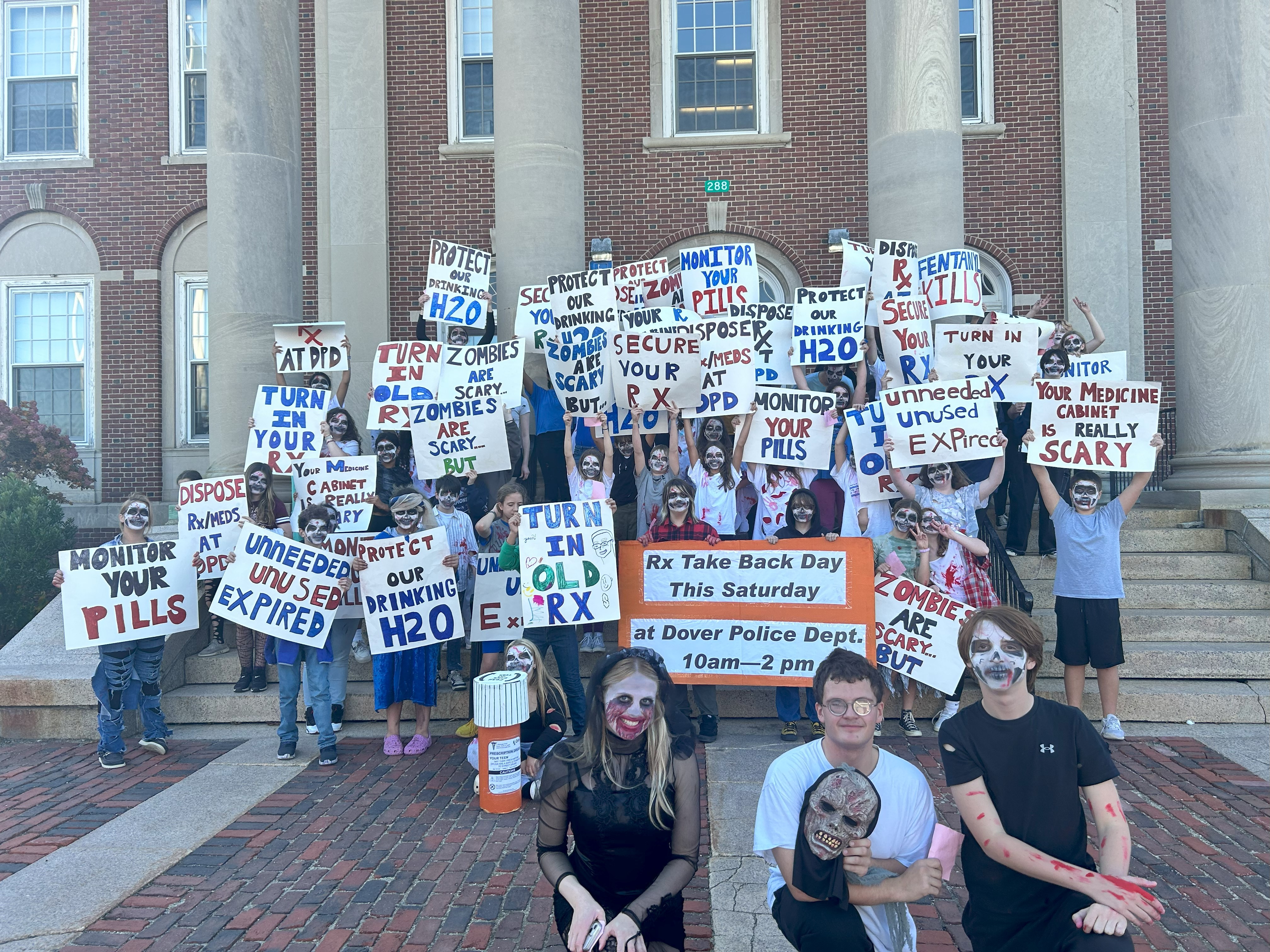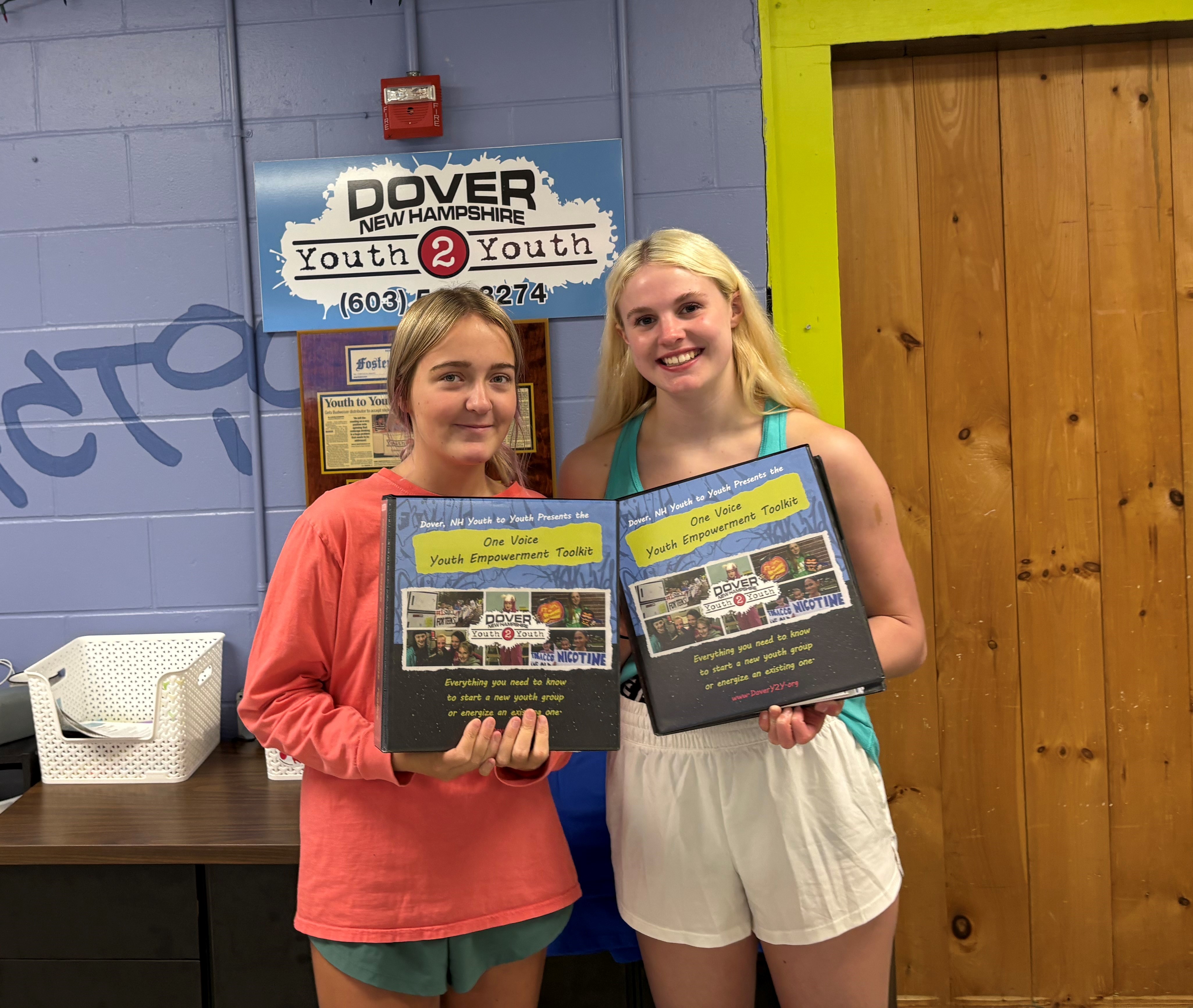What Do Zombies and Drug Prevention Have in Common?
Last Updated: Tuesday February 24, 2026
This is the 15th installment in a series of profiles featuring both DEA personnel, as well as now statewide drug misuse prevention groups. Learn about the tough but fulfilling, fascinating, and vital work these individuals and organizations do, as well as the many different ways to get involved in fighting drug misuse. For our 15th profile, we will be interviewing Dover Youth to Youth, based in New Hampshire.
What motivated you to start and/or join Dover Youth to Youth?
Dover Youth to Youth (Y2Y) was established by the Dover Police Department in February 1992 as a means for the community's youth to take action and be part of the solution to substance misuse problems.
It was started with a core group of 11 sixth graders and has grown to an active group of 70 or more students in grades 6-12, working on several "action teams." A team usually has 14-20+ students and two or three advisers. Each team has its own projects and activities, although it is common for the teams to work jointly on many projects.
Students join Y2Y for a variety of reasons, including an interest in advocacy or a personal connection to drug prevention issues. Every July, Y2Y hosts a week-long summer program that introduces potential new members to the activities Y2Y offers. Most students who go through this program sign up to join Y2Y during the school year.
What does an average day with Dover Youth to Youth drug use prevention look like?
The day-to-day activities of Dover Y2Y vary from week to week. Each week, the separate action teams will meet for two hours to develop their knowledge and skills and work on action projects in four categories: education, community awareness, policy change, and media. Additionally, Y2Y provides training and technical assistance for other youth groups locally and nationally who also work in substance misuse prevention.
Educational activities include presentations on medicine safety in early elementary school grades, assemblies on alcohol or nicotine at the middle school level, community presentations, and technical assistance to other youth groups seeking to establish themselves.
Media efforts include short videos and radio PSAs on a wide variety of topics. Dover Youth to Youth members have made over 200 PSAs over the years.
Our group has also proposed and passed eight city ordinances and three state laws, including New Hampshire’s Party Host Law, making it illegal to host a drug or alcohol party on your property. Each year, we also undertake a wide variety of community campaigns and projects, including our “Zombie Project,” where students dress up as zombies and distribute info on DEA’s Drug Take Back Day, a few days before the take-back event. The slogan is: “If you think zombies are scary, just look in your medicine cabinet."

What has been your proudest moment as an organization?
One of Dover Y2Y's proudest moments was becoming an evidence-based program in New Hampshire. We were first designated as a SAMHSA Service to Science site and received federal technical assistance in designing our research in 2009. In 2013, we were recognized by the New Hampshire Expert Panel as an evidence-based program. Becoming evidence-based opened up new opportunities for us to share our model of youth empowerment with other youth groups. We also developed a structured toolkit that we use to help other coalitions implement our model.
What is your advice for other youth who wish to get involved in drug use prevention and even start a similar group of their own?
Our best advice is to not reinvent the wheel. Initiatives by national organizations like DEA’s Red Ribbon Week, SAMHSA’s National Prevention Week, and NIH’s National Drug and Alcohol Facts Week also have resources and ideas to take action.
Y2Y becoming evidence-based opened up new opportunities for us to share our model of youth empowerment with other youth groups. And part of our obligation in becoming an evidence-based program was to develop resources to assist others in implementing our model of youth empowerment. To that end, we created a comprehensive toolkit containing all the resources and instructions we have developed over the years of programming. Each module of the toolkit provides the user with a detailed explanation of an action project or instruction on how to develop a core advocacy skill – such as public speaking or creating media. The toolkit has been adopted by several states and provided to hundreds of coalitions throughout the U.S.

The synthetic opioid fentanyl – often mixed into other drugs – is now responsible for tens of thousands of American deaths per year. How has the fentanyl epidemic impacted your work?
The fentanyl epidemic has had a significant impact on the Dover community and the work of Dover Youth to Youth (Y2Y). In 2024, Y2Y launched a new campaign to address this issue called the "Dealer is Not a Doctor" campaign. This campaign takes a community awareness approach that focuses on counterfeit pills laced with fentanyl that look like real prescription drugs. The campaign theme centers on the message "A Dealer is Not a Doctor." In other words, a peer or someone providing you pills of any kind is not qualified to keep you safe or protect your health – they are looking to make money. The messaging attempts to warn the kids and the community that they should not take any prescription medication unless a doctor has prescribed it and focuses on the very real risk that many of these pills are counterfeit and contain varying, and potentially deadly, levels of fentanyl.
Before launching the campaign, local DEA agents assisted us by providing training to our students on fentanyl, counterfeit pills, recent investigations, and generally what they are seeing locally. Y2Y students used this information to craft their messaging for the "Dealer is not a Doctor" Campaign. Dover Y2Y launched this campaign in July 2024 with a kick-off rally in downtown Dover, NH. Over forty Y2Y students came together to hold posters, shout chants, and hand out palm cards to pedestrians on the street. The rally concluded with a press conference, at which Dover Y2Y announced the campaign to the media. Dover Youth to Youth and our local adult group, the Dover Coalition for Youth, have been conducting follow-up activities and projects to raise awareness about these problems.
Aug. 1, 2023 Profile: Meet Special Agent Dave
Aug. 17, 2023 Profile: From Searching Tunnels to Undercover at a Rave...
Aug. 31, 2023 Profile: Fighting the Jalisco Cartel as an Intelligence Analyst
Sept. 14, 2023 Profile: Working With His Wife to Dismantle Drug-Peddling Prison Gang
Sept. 28, 2023 Profile: Meth Hidden in a Gas Tank? Helping DEA as a Chemist
Oct. 18, 2023 Profile: From Teaching English to Helping Capture El Chapo
Nov. 2, 2023 Profile: Phone Forensics: Diving Into Digital Evidence
Nov. 16, 2023 Profile: Inside the World of Chemistry, Calculations, and Clandestine Labs
Jan. 4, 2024 Profile: Training Female Law Enforcement Officers in Afghanistan and Saudi Arabia
Jan. 18, 2024 Profile: Getting the 'Friday Scaries' as a Strategic Analyst
Feb. 8, 2024 Profile: Hear From a DEA Pharmacologist Who Collects Data to Schedule Drugs
Mar. 11, 2024 Profile: Classrooms to Conferences: Connecting the Community to Fight Drug Misuse
May 9, 2024 Profile: Tackling Cyber Crime With DEA's Special Ops
July 10, 2024 Profile: How Drugs Can Be 'Hidden in Plain Sight'

